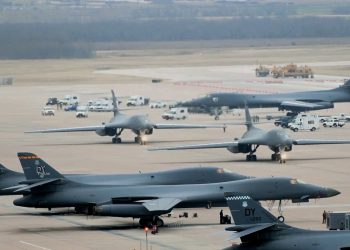General Atomics Aeronautical Systems, SAN DIEGO: General Atomics Aeronautical Systems, Inc. (GA ASI), a leading manufacturer of unmanned aircraft systems (UAS) and tactical reconnaissance radars, today announced that it has successfully completed wind tunnel testing on a model of its Mariner unmanned aircraft.
GA-ASI conducted aerodynamic testing of the Mariner airframe to support the selection of Team Mariner UAS, an initiative with advanced electronics systems integrator Lockheed Martin, as the solution for the U.S. Navy’s Broad Area Maritime Surveillance (BAMS) program.
“We are pleased that Mariner’s wind tunnel results exceeded our expectations,” said Thomas J. Cassidy, Jr., president, Aircraft Systems Group, General Atomics Aeronautical Systems, Inc. “The airframe model was subjected to extensive testing under calibrated conditions and rigorous analyses by a team of aerodynamic experts. Preliminary evaluations validated key competitive capabilities of the aircraft and suggest that Mariner’s design is even more efficient than originally assumed. In short, wind tunnel testing has confirmed Mariner’s capability to provide the U.S. Navy with superior BAMS mission performance far into the future.”
Testing was conducted over a two-week period at the San Diego Air & Space Technology Center in southern California with a one-tenth scale model of the Mariner aircraft. The Mariner design is a derivative of the company’s operationally proven turboprop Predator B unmanned aircraft that has been optimized for the unique demands of the Navy, assuring a low-cost and low-risk solution to meet the service’s needs.
Aerodynamic testing was performed by a team of engineers from GA-ASI’s Flight Technologies Department and the San Diego Air & Space Technology Center, as well as personnel from the model’s manufacturer, Patersonlabs, Inc. of Kent, Wash. The goal of the testing was to validate key metrics related to the design performance of the Mariner aircraft.
The Mariner wind tunnel testing will help reduce program risks by providing additional data to improve model fidelity, instead of relying on computational analyses alone. It also provided the opportunity to correlate key performance data to analytical tools such as computational fluid dynamics and to calibrate various analytical methods. In addition, the testing enabled a specific set of configuration changes to be evaluated economically, at a faster pace, and for important performance sensitivities to be generated.
Designed to provide unmanned persistent Intelligence, Surveillance, and Reconnaissance (ISR) over littoral and broad ocean areas of interest, the Mariner UAS will provide for planning, control, tasking, collection, processing, analysis, and dissemination of actionable information in support of the U.S. Navy. Mariner is the centerpiece of the Team Mariner UAS proposal to the U.S. Navy, offering a tactically superior system with all-weather performance, maneuverability, altitude agility, and proven mission systems to detect, locate, track, classify, and positively identify maritime surface targets of interest in varying seas states, day or night.
The GA-ASI and Lockheed Martin team previously demonstrated the Mariner’s tactical flexibility during the U.S. Navy’s Trident Warrior 06 exercise. With more than 45 years experience in maritime surveillance and combat-proven platforms that have logged over 325,000 flight hours, Team Mariner UAS offers a fully capable low-risk solution, providing the Navy tactical user with a persistent ISR capability not previously available. An evolution of the combat-proven Predator B series with high-performance maritime payloads, Mariner UAS provides the highest operational value while being the only affordable system.
General Atomics Aeronautical Systems, Inc., an affiliate of General Atomics, provides comprehensive unmanned aircraft and radar solutions for military and commercial applications worldwide. The company’s Aircraft Systems Group is a leading designer and manufacturer of proven, reliable unmanned aircraft systems, including Predator, Predator B, and Sky Warrior, and provides pilot training and support services for UAS field operations.
Headquartered in Bethesda, Md., Lockheed Martin employs about 140,000 people worldwide and is principally engaged in the research, design, development, manufacture, integration and sustainment of advanced technology systems, products and services.
Team Mariner UAS key providers include EDO, Honeywell, FLIR Systems, LSI, SNA Corp, and SAAB.
Beijing slams US over potential Chinese drone ban
China said on Friday it would take "all necessary measures" in response to the United States announcing it was considering...








